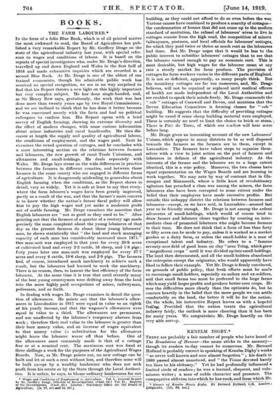KENELM DIGBY.*
THERE are probably a fair number of people who have heard of The Broadetone of Honour—the name sticks in the memory— though its readers to-day cannot be numerous. Mr. Bernard Holland is probably correct in speaking of Kenelm Digby's works "as never well known and now almost forgotten " ; his death in 1880 passed almost unnoticed, and "the Times devoted barely ten lines to his obituary." Yet he had profoundly influenced a limited circle of readers ; he was a learned, eloquent, and volu- minous writer ; a man of noble character and presence. The eompalative oblivion into which he has sunk,and from which Mr.
• Memoir of Hendon Henry DA/. By Bernard Holland, C.B. Landes LOnlimans. life. Hd. net.] -
Holland has sought to rescue him with an almost filial piety, is not hard to explain. Ho took no Part in public affairs. He had a. Mediaeval mind, and, in the words of his biographer, "was a chivalric figure, almost seeming born out of his right period of history into the nineteenth century." Moreover, the scale of his works and his method of publishing them in instalments did not appeal to the ordinary reader and alienated the tribe of Indolent reviewers. Ho bad not the gift of compression ; ho wrote to please himself in his own way, and paid the penalty of his independence.
The story of his life was uneventful yet not unromantic. Sprung from the Irish branch of his historic line, the son of an Irish Dorm, he entered Cambridge in the year of Waterloo, taking his degree in 1819. He claimed to be 'the founder of boating on the Cam," and there is a charming portrait of him in Edward FitzGerald's Eupleanor : "a grand, swarthy fellow who might have stept out of the canvas of some knightly portrait in his father's hearse—perhaps the living image of one sleeping under some oroas-legg'd effigies in the church," In the same dialogue the young Alfred Tennyson is called "a man at all points, Euphranor,—like your Digby—of grand proportion and figure, becoming his ancient and honourable race." On taking his degree Digby raado Cambridge his headquarters for several years, and numbered Whemell, Julius Hare, and Adam Sedgwick amongst his intimate friends. He travelled widely in England on horse or foot and round the Continent ta a "pilgrim of romance" or a wandering scholar ; in 1822 he published two parts of The Broadstone of Honour—the name of which he bor- rowed from the ruined castle of Ehrenbreitaten—was received into the Roman Catholic Church in 1825, and in 1826 published a new Broadstone much enlarged. A third edition followed in 1828. In 1829 and 1830, while living partly at Cambridge and partly at St. Germain, he began his longest work, Mores Catholici, which tecupied him for more than ten years, and was completed in eleven volumes, published between 1831 and 1842. In 1833 he married Miss Jane Mary Dillon, an Irish lady of a family bound by double ties to Ireland and France. During the early years of his married life he lived largely in Paris or at St. Germain, though often spending the summer or autumn in England. Com- pliant, in seven volumes, was written between 1849 and 1854. From 1851 to 1856 he lived at Ramsgate, years of happiness clouded by the deaths of three beloved children. From 1856 till his death he lived at Shaftesbury House, Kensington, a roomy house with a large garden. His wife died in 1860, and his last years were spent in ever-increasing loneliness. His eldest daughter, a fine scholar, sociable, attractive, the nearest of all his children to himself in mind, tastes, and interests, asked his leave to become a Nun, and on his refusal left her home and entered tho Convent of the Sacred Heart. " Kenelm Dishy," remarks Mr. Holland, "was not the first, nor will be the last, father who has entered the Catholic Church, and has then seen his children go beyond him in devotion." For the miscellaneous works in prose and in verse of his later years, though they are based on a firm belief in the "use of authority in religion" as a source of happiness and real freedom of mind, show "a certain reaction as regards the study of Christian antiquity and mediaeval history." In all these later volumes "he assails those who divide too absolutely the sphere of religion from that of the general life of the world "—like the Port-Royal school in France and the Puritans in England. "Ho was, if one may use the expression, a Christian Epicurean, not a Christian Stoic. To him all plearturts were good, and of divine nature and origin, when they were pore. Those who broke away from the Catholic Church had done, he thought, their utmost to divorce religion from the natural joys of life, and had even, to sonic degree, infected with this false view the Catholic Church itself." So we find him writing with gentle enthusiasm of inns in various lands and ages, especially those on the Thames, of the pleasures of London and its suburbs. But while he loved England and its rural scenery, he was perhaps most at home in France. In the " thirties " and " forties " he had known most of the great men of the time in Paris, and was on intimate terms with Lacordaire and Lamartine, Chateaubriand and Montalembert. By no one were his works more generously praised than by Xontalembert, who said of his Mores Catholici : "the best book to make the Middle Ages known and loved is the work of a layman, and of a layman gone over from Anglicanism to the Church." Digby's intellectual affinity with the author of the Genie du C'hristianisme is so marked that be might be stilled the English Chateaubriand. His own ideas were
"always rather those of a grand seigneur " ; he was a strong Legitimist ; and from long experience—he frequently used to visit friends in Brittany till the end of his life—he found in the French provincial nobles the best exemplars of Christian virtue and exquisite manners.
To revert to Digby's chief works: The Broadstoue of Honour, or " the true sense and practice of chivalry," describes the heroic and chivalrous spirit, intimately bound up with the religious faith, as it appeared in the Middle Ages, and found a cordial admircrin Ruskin. The first two parts, Godefridus and Taneredus, were described by Julius Hare as a "noble manual for gentlemen, a volume which, had I a son, I would place in his hands, charging him, though such prompting would be needless, to love it next to his Bible." Hare revised his verdict when the Monts and Orfandua were added, admitting an oven greater richness in "magnanimous and holy thoughts and in take of honour and piety," but deploring the writer's implacable hostility to Pro- testantiam. In the Mores Catholici Digby shows by a multitude of quotations how each of the eight beatitudes of the Sermon on the Mount was realized in practice, in the Ages of Faith, "the Faith which though still continuing was, he thinks, broken and diminished by, and since, the religious revolution of the sixteenth century." The idea of a road-pierced forest, with the Catholic Church as the central meeting-place of all the roads of "life," is carried throughout the seven volumes of C.ompitum, crowded with a wealth of quotations drawn from Digby's encyclopaedic reading of classical and mediaeval literature. JuliusHare charged Digby with "insolent bigotry" in these later works. Mr. Holland asserts that he was "in advance of his time in reinstating the in- tellectual position of the Middle Ages " ; that at a time when the efforts of misrepresentation had been exhausted by three cen- turies of calumny, and when "additional criticism of the Catholic Church, either in the past or the present, was quite superfluous," Digby assisted in restoring the balance by "a strong defence of Catholic principles, and a record of innumerable and forgotten good fruits of them, supported by solid evidence and by a very great deal of it. This work was done with results in the way of modification of English opinion and correction of English ignorance upon this subject which has rarely been credited to this almost forgotten author." These are high claims, but Mr. Holland writes throughout with a passionate fervour for the "Central Church." The book is not an apologia for but a paean in honour of the Church of Rome. "The Christian religion," Mr. Holland tells us, "is a love affair, and the complete consum- mation so far as it can be on earth is in or through the Catholic, Church." Such violence of language was foreign to Digby, who urged that in disputes between Catholics and non-Catholics the former, at least, should express themselves in more tolerant and considerate language than they de, and deprecated yielding to argument "if you are only inflamed by the words of another."
MI . Holland, though a provocative and unconventional writer, is always engaging. His hero-worship is sincere, and he has given us an admirable study of a noble and dignified personality. His book lacks an index, and the absence of any portrait of Dishy is to be regretted.



































 Previous page
Previous page